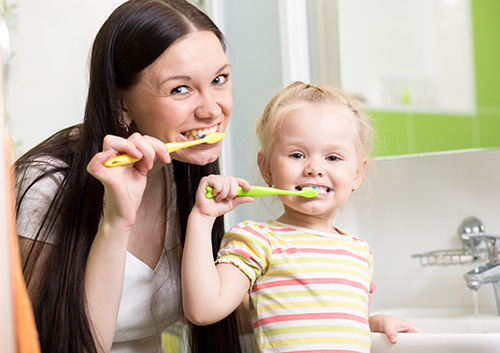
Quick trivia question: define “mamelon.” Some kind of warm blooded animal? No, not a member of the mammal clan, but good guess. A fruit of the gourd family? Nope! There are watermelons, and honeydew melons, and even canary melons, but no ma-melons. Those little rounded bumps you notice on the edge of your child’s permanent incisors when they first emerge? We have a winning answer!
We have eight incisors, or biting teeth, in the front of our mouths—four on top and four on bottom. Mamelons are actually a clue as to how these incisors were formed. Even before a baby is born, the permanent teeth begin to take shape. Three different groups of cells develop to form the incisal edge of these front teeth. As they fuse together, they create three lobes of enamel on the erupting edge of the tooth. It’s these lobes, or bumps, that give the teeth a serrated appearance.
Whether your child’s mamelons are quite prominent or barely noticeable, if you are worried about them, relax! They are almost always a temporary part of your child’s smile, and disappear over time with chewing and normal wear. But what if the mamelons overstay their welcome?
Because mamelons are composed of enamel, without the underlying dentin layer found in the body of the tooth, they can appear translucent or a bit different in color. They might wear away unevenly, leaving the tooth edges looking misaligned. Or, they might not wear away at all if your child’s tooth eruption is delayed. Talk to Dr. Dinah Abioro if mamelons are a cosmetic concern for you or your child. You might discover that they are wearing away naturally, or we can discuss ways to polish or smooth them down if needed. This is a painless procedure that doesn’t require an anesthetic. Generally, however, this is a matter where time will resolve the issue for you.
Occasionally, mamelons might become a topic of discussion for orthodontic reasons. Sometimes, mamelons do not wear away over time because of a malocclusion (misaligned bite). Your orthodontist will let you know your child has a bite problem and can explain treatment options. Your orthodontist might also suggest smoothing away the mamelons to ensure that the edges of the incisors align correctly and symmetrically while the teeth are in the process of straightening. Again, this is not always considered a necessity, so weigh your options with your dental care provider.
So, if you notice that your child’s beautiful new teeth are bumpy or serrated as they erupt, don’t be concerned! If you have any questions about mamelons, talk to Dr. Dinah Abioro at your next visit to our Bowie office. This is a natural occurrence and most likely just a temporary “bump” in the road. Soon enough, mamelons will be a memory—and the answer to a pretty difficult trivia question.









